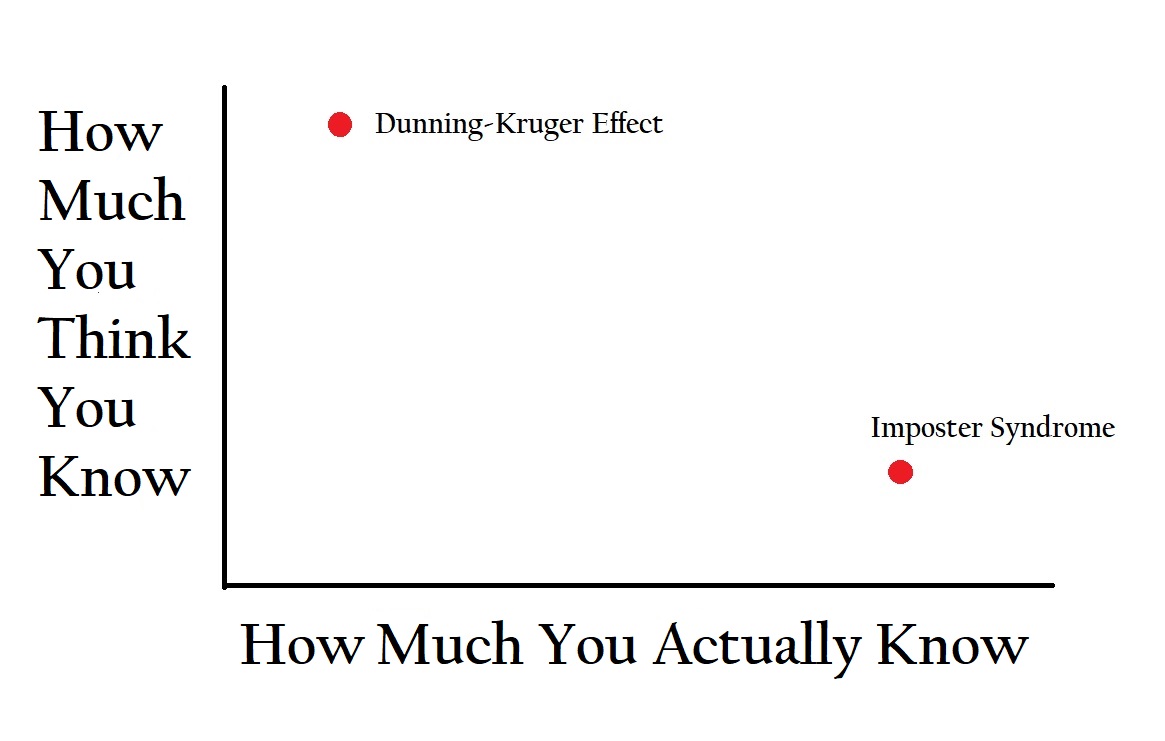The Stupidity of the Smartest Person in the Room
By Scott Anderson
(For the video version of this blog, click here)
I’ve written a lot about Imposter Syndrome – thinking you know less than you actually know – and its prevalence with many of my high-performance entrepreneur coaching clients.
As bad as feeling like an imposter can be, both professionally and personally, its polar opposite – thinking you know more than you actually know – is potentially a greater threat to entrepreneurs’ businesses and relationships.
We might call this “The Smartest Person In The Room Syndrome”. But two psychologists who documented its causes and effects, David Dunning and Jason Kruger, won the Nobel Prize in 2000 for research into what they called the Dunning-Kruger Effect.
The diagram below (all thanks to the coach’s coach, Rich Litvin: richlitvin.com) illustrates the opposite but similarly risky aspects of both Imposter Syndrome and Dunning-Kruger Effect.
The perpendicular (“y”) axis measures how much you think you know.
The horizontal (“x”) axis measures how much you actually know.
Those who experience Imposter Syndrome underestimate what they actually know, attributing their success instead to luck, “being in the right place at the right time”, or having the “right connections”.
Not surprisingly, executives who doubt their abilities may lose confidence and potentially shy away from opportunities for which they are actually well-qualified.
We would plot those with Imposter Syndrome low on the “y” axis (they think they know less than they actually know) and high on the “x” axis (how much they actually know).
Those who experience Dunning-Kruger Effect overestimate what they actually know (though they usually aren’t aware of it), inaccurately projecting their knowledge and/or success in one area to other areas.
As Charles Darwin wrote in The Descent of Man, “Ignorance more frequently begets confidence than does knowledge.”
For example, a successful entrepreneur in the food business who sells her successful business to a private equity company may assume she would also be knowledgeable and successful in unrelated businesses, say the private equity industry, investment banking or other unrelated businesses.
We would plot those with Dunning-Kruger Effect high on the “y” axis (they think they know more than they do) and low on the “x” axis (how much they actually know).
“Ignorance more frequently begets confidence than does knowledge.”
Whereas Imposter Syndrome causes people to avoid risk (and opportunity) due to under-estimated competence, Dunning-Kruger Effect can cause people to take potentially disastrous risks due to over-estimated competence.
Both syndromes result from a lack of awareness, and both can be rectified by increasing awareness. In my experience, however, it is generally more difficult to help the “smartest people in the room” acknowledge that their confidence may be misplaced.
This may explain why it is common for entrepreneurs to succeed with their first venture and fail with their second.
Both Imposter Syndrome and Dunning-Kruger Effect present potential risk and lost opportunity. But the threat the latter poses to business and relationship success is often more severe.
For information on how to deal with Imposter Syndrome and Dunning Kruger Effect in yourself or your team, email me for a free entrepreneur coaching consultation: Scott@Doubledareyou.us



